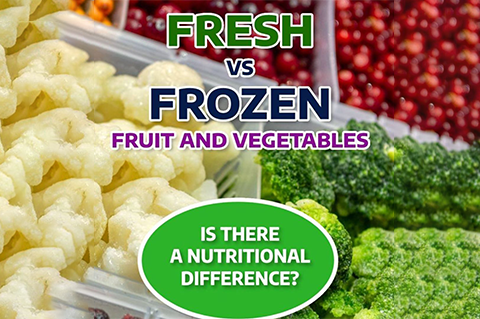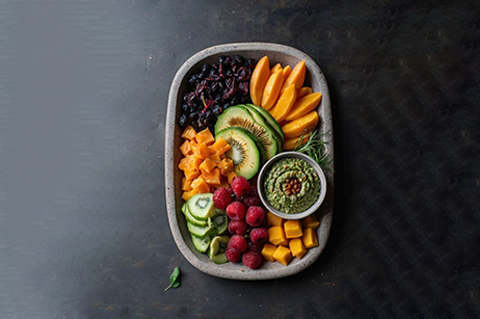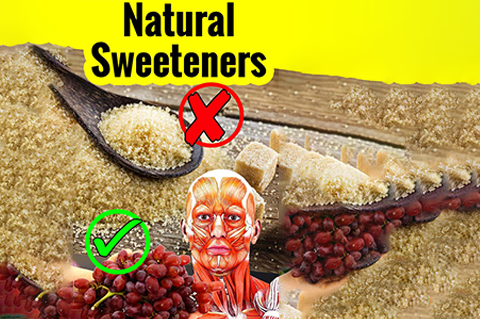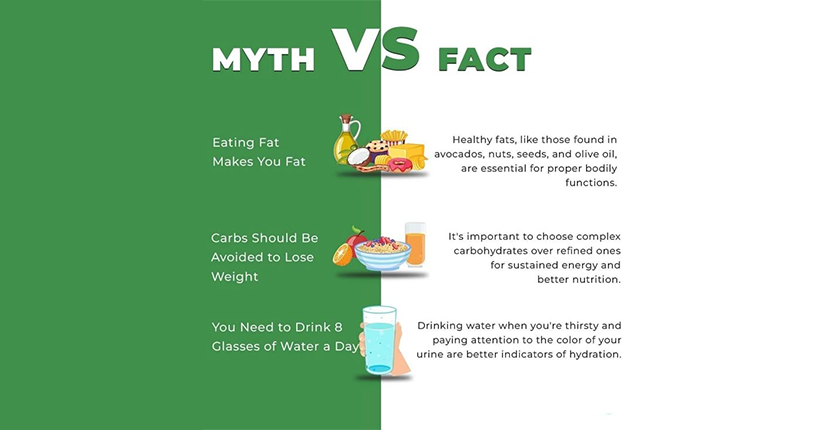Although food plays a major role in our daily lives, there are a lot of misunderstandings around it. From diet trends on social media to advice passed down from family members, Myths and Misconceptions we are constantly bombarded with so many facts about what we should or should not eat. Some of these claims may sound convincing, but many are not sound like convincing. Instead, they create myths that influence our eating habits and sometimes even lead us away from a balanced, healthy diet.
Some Common Myths and Misconception
Myth 1: Carbs Are the Enemy
- Not all carbohydrates are bad for our health, despite the widespread belief that they lead to weight gain and should be avoided.
- Refined carbs like pastries and white bread can lead to weight gain, while whole grains, fruits, vegetables, and legumes provide fibre, vitamins, and energy. Cutting carbs completely may leave you tired, irritable, and nutritionally imbalanced.
The truth: Carbs are not inherently bad it’s the type and quantity that matter, so focus on whole, unprocessed sources rather than refined ones.
Myth 2: Eating Fat Makes You Fat
- For years, fat was blamed for obesity and heart disease, but research shows healthy fats are essential. Good fats like those in avocados, nuts, seeds, olive oil, and fatty fish support heart, brain, and hormone health, while trans fats and excess saturated fats from fried and processed foods can be harmful.
The truth: Healthy fats are crucial for a balanced diet. Instead of avoiding fat altogether, choose good sources and consume them in moderation.

Myth 3: Fresh Produce Is Always Better Than Frozen
- Many people assume that frozen fruits and vegetables are less nutritious than fresh ones, but the opposite can often be true. While fresh produce may lose nutrients during long transportation and storage, frozen options are usually picked at peak ripeness and flash-frozen to lock in their nutritional value. They are convenient, affordable, and an easy way to enjoy healthy foods all year round.
The truth: Frozen fruits and vegetables can be just as nutritious as the fresh produced fruits and vegetables. Both are healthy, so choose what works best for your budget and lifestyle.
Myth 4: Late-Night Eating Causes Weight Gain
- Eating after 8 p.m. doesn’t automatically cause weight gain—it’s about total calories consumed versus burned. The problem is late-night snacking often means unhealthy, high-calorie foods, which can add up and even disrupt sleep.
The truth: It’s not the timing of your meals that causes weight gain but the overall quality and quantity of your diet.

Myth 5: Detox Diets Cleanse Your Body
- Juice cleanses, detox teas, and other miracle diets promise to flush toxins out of the body and reset your health. While these products may sound appealing, the human body already has a highly effective detoxification system.
- Detox diets often involve extreme calorie restriction and can leave you feeling weak, dizzy, or deprived. Instead of relying on gimmicks, a balanced diet rich in fruits, vegetables, whole grains, and plenty of water supports your body’s natural detoxification process.
The truth: Your body does not need fancy cleanses. Eating a nutritious, balanced diet and staying hydrated is the best way to detox.
Myth 6: Eggs Are Bad for Your Heart
- For years, eggs were criticized for their cholesterol content and linked to heart disease, but research now states that dietary cholesterol from eggs has little impact on blood cholesterol for most people.
- Rich in high-quality protein, vitamin B12, choline, and antioxidants like lutein and zeaxanthin that support eye health, eggs can be a nutritious part of a balanced diet unless specific medical conditions require limiting cholesterol.
The truth: Eggs are nutritious and can safely be enjoyed in moderation as part of a balanced diet.

Myth 7: Natural Sugar Is Better Than Refined Sugar
- Honey, maple syrup, and coconut sugar are often marketed as healthier alternatives to white sugar. While these sweeteners may contain trace amounts of minerals.
- They are still forms of sugar and affects the body in a similar way.
- Overconsumption of any type of added sugar can contribute to weight gain, insulin resistance, and other health issues.
The truth: Natural sugars are not free passes. Use them sparingly, just as you would with refined sugar.
Conclusion
Food myths and misconceptions are often spread faster than scientific evidence, it leads to poor but the truth is that balance and moderation matter more than restrictive or trendy rules. Instead of fearing carbs, fats, or late-night meals, focusing on whole grain, nutrient-rich foods, staying active, and listening to your body supports long-term health. By replacing myths with facts, we empower ourselves to enjoy food without any guilt and leads to a healthier and more fulfilling lives.




